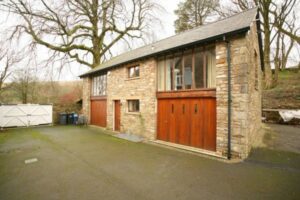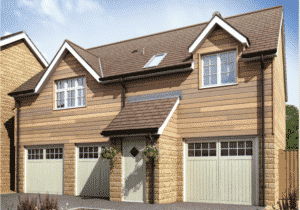What is a coach house?
Coach houses also known as carriage houses, remise or cart sheds have been around for centuries. They are a hybrid of a detached freehold and an apartment with a deep historical background. They are distinctive properties that will not suit everybody. If you have a car and don’t mind a smaller space it can be a match made in…coach house! They offer an abundance of privacy as they are only neighbouring the surrounding properties. House Buy Fast put together a comprehensive guide to coach houses, where you can learn all about the advantages and the downsides of living in a coach house.
What kind of property is a coach house?
Historical coach house
Coach houses originated from the 18th-century outbuilding, where owners kept houses and carriages safe. It was important to keep them and the accessories safe. They were built near detached houses as a symbol of the wealth and status of the homeowner as not everyone was able to afford to have horses and carriages for their sole use.
Modern coach house
Over time the idea has evolved and in the modern era, where conversions gain popularity coach houses can provide a unique way of living. Generally, garages even though they belong to coach houses can be leased to neighbours. Usually, they provide more parking spaces.
They will often have some outdoor space. Green space is always a welcome addition to the property. You can find many new developments providing coach house style – detached houses with living space on the first floor and leasehold garages on the ground floor.
Freehold or a leasehold?
The answer is – it depends. Generally speaking, a coach house is a freehold property. You can own the entire building, or what is more popular in new developments, downstairs garages are sold separately with long term leases.
What does the coach house look like?



Coach houses differ from house to house but they are based on the same design concept. Even though it’s a detached house from an owner’s perspective it’s flat above the garage or when one of the garages. Often the property comes with garden access.
If you are considering buying a coach house, double-check what are they offering for the asking price, get some financial advice as they can be very different and do not have the same amenities.
Does coachhouse always come with a garage?
The short answer is yes.
But do not worry if you’re not the car owner. Typically you will own one of the garages and you can rent them out as leasehold garages. If there are two garages under the property it only means that one belongs to you and the other you can lease but nothing is stopping you from renting them both out.
They are often rented out on peppercorn rents but all the details will be included in the legally binding lease.
Are coach houses notoriously cold?
It’s a very common question when it comes to that kind of property and rightly so.
In the past coach houses were poorly insulated as the property served a different purpose and simply didn’t need to be. Often was one of the other buildings that were in possession of the landowner.
Modern properties, and the properties that have been converted into a flat offer a much better quality of living.
If the asking price seems like a too good value for money it is worth checking how well is the flat insulated, what kind of heating does it have, or maybe the space has underfloor heating? It’s a detached property so there’s nothing to warm the walls up from the outside and below, as garage buildings are not heated.
Do I need a specialist insurer and is the home insurance more expensive than their flat counterparts? Does a coach house count as a flat?
The house insurance when it comes to coach house insurance might be a bit tricky as you’re the owner of the freehold and at the same time you’re renting out a garage which is a part of the building.
It might take a while to find an appropriate cover for the property. It is your insurance responsibility to find the right home insurance that will cover the freehold top floor and leasehold garages.
Many leading insurance companies will not provide insurance for properties like yours. Coach house ownership comes with some downfalls and that is one of them. When you find insurance that is right for you, it should not cost much more than any other insurance.
The pros and cons of living in coach houses
Advantages:
- it’s a detached property so your only neighbours the garages underneath
- relatively low maintenance as the property is a mix of a flat and a detached house
- a lot of privacy if compared to apartment living
- you own the whole building
- competitive pricing
Conclusion:
Coach house ownership comes with some strong benefits. You are the freehold owner and you rent the garages that are underneath your flat to surrounding properties and you charge them rent. It’s a very unique way of living. It will definitely not fit everybody’s needs as the living area is usually limited as historically never needed to be large. I won’t be suitable for a big family. It requires bespoke insurance It can serve greatly a young professional. There are many pros and cons to consider before making a final decision.
At House Buy Fast we have a team of experts with years of experience to help you if you decide that you need to sell your property quickly. As professional buyers, we have bought hundreds of properties and helped many clients – we’ve never bought a coach house! You can contact us today for an instant valuation!
Got more questions?
Contact us and ask us directly either by email or phone. We will be more than happy to help.